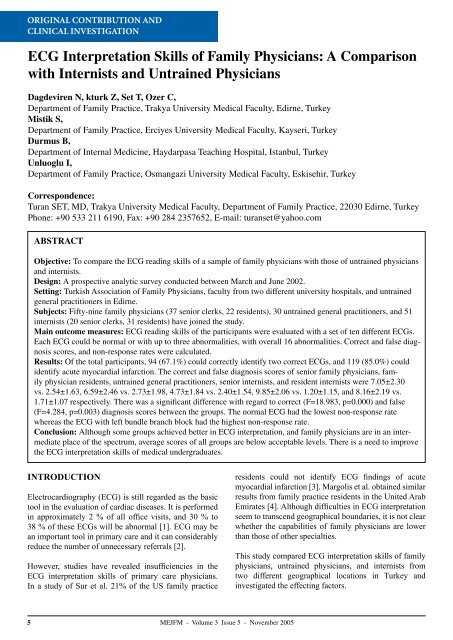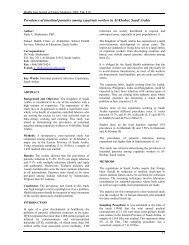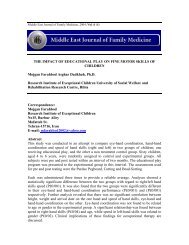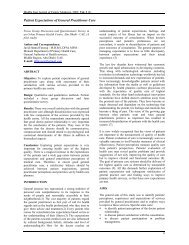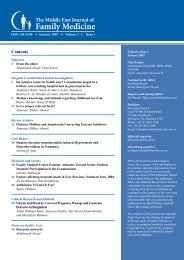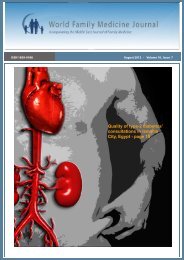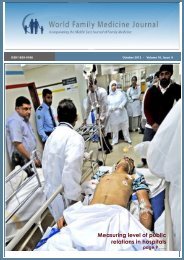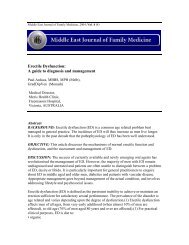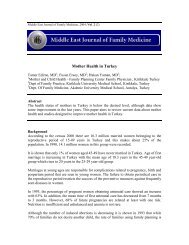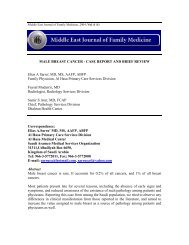Contents - Middle East Journal of Family Medicine
Contents - Middle East Journal of Family Medicine
Contents - Middle East Journal of Family Medicine
You also want an ePaper? Increase the reach of your titles
YUMPU automatically turns print PDFs into web optimized ePapers that Google loves.
ORIGINAL CONTRIBUTION AND<br />
CLINICAL INVESTIGATION<br />
ECG Interpretation Skills <strong>of</strong> <strong>Family</strong> Physicians: A Comparison<br />
with Internists and Untrained Physicians<br />
Dagdeviren N, kturk Z, Set T, Ozer C,<br />
Department <strong>of</strong> <strong>Family</strong> Practice, Trakya University Medical Faculty, Edirne, Turkey<br />
Mistik S,<br />
Department <strong>of</strong> <strong>Family</strong> Practice, Erciyes University Medical Faculty, Kayseri, Turkey<br />
Durmus B,<br />
Department <strong>of</strong> Internal <strong>Medicine</strong>, Haydarpasa Teaching Hospital, Istanbul, Turkey<br />
Unluoglu I,<br />
Department <strong>of</strong> <strong>Family</strong> Practice, Osmangazi University Medical Faculty, Eskisehir, Turkey<br />
Correspondence:<br />
Turan SET, MD, Trakya University Medical Faculty, Department <strong>of</strong> <strong>Family</strong> Practice, 22030 Edirne, Turkey<br />
Phone: +90 533 211 6190, Fax: +90 284 2357652, E-mail: turanset@yahoo.com<br />
ABSTRACT<br />
Objective: To compare the ECG reading skills <strong>of</strong> a sample <strong>of</strong> family physicians with those <strong>of</strong> untrained physicians<br />
and internists.<br />
Design: A prospective analytic survey conducted between March and June 2002.<br />
Setting: Turkish Association <strong>of</strong> <strong>Family</strong> Physicians, faculty from two different university hospitals, and untrained<br />
general practitioners in Edirne.<br />
Subjects: Fifty-nine family physicians (37 senior clerks, 22 residents), 30 untrained general practitioners, and 51<br />
internists (20 senior clerks, 31 residents) have joined the study.<br />
Main outcome measures: ECG reading skills <strong>of</strong> the participants were evaluated with a set <strong>of</strong> ten different ECGs.<br />
Each ECG could be normal or with up to three abnormalities, with overall 16 abnormalities. Correct and false diagnosis<br />
scores, and non-response rates were calculated.<br />
Results: Of the total participants, 94 (67.1%) could correctly identify two correct ECGs, and 119 (85.0%) could<br />
identify acute myocardial infarction. The correct and false diagnosis scores <strong>of</strong> senior family physicians, family<br />
physician residents, untrained general practitioners, senior internists, and resident internists were 7.05±2.30<br />
vs. 2.54±1.63, 6.59±2.46 vs. 2.73±1.98, 4.73±1.84 vs. 2.40±1.54, 9.85±2.06 vs. 1.20±1.15, and 8.16±2.19 vs.<br />
1.71±1.07 respectively. There was a significant difference with regard to correct (F=18.983, p=0.000) and false<br />
(F=4.284, p=0.003) diagnosis scores between the groups. The normal ECG had the lowest non-response rate<br />
whereas the ECG with left bundle branch block had the highest non-response rate.<br />
Conclusion: Although some groups achieved better in ECG interpretation, and family physicians are in an intermediate<br />
place <strong>of</strong> the spectrum, average scores <strong>of</strong> all groups are below acceptable levels. There is a need to improve<br />
the ECG interpretation skills <strong>of</strong> medical undergraduates.<br />
INTRODUCTION<br />
Electrocardiography (ECG) is still regarded as the basic<br />
tool in the evaluation <strong>of</strong> cardiac diseases. It is performed<br />
in approximately 2 % <strong>of</strong> all <strong>of</strong>fice visits, and 30 % to<br />
38 % <strong>of</strong> these ECGs will be abnormal [1]. ECG may be<br />
an important tool in primary care and it can considerably<br />
reduce the number <strong>of</strong> unnecessary referrals [2].<br />
However, studies have revealed insufficiencies in the<br />
ECG interpretation skills <strong>of</strong> primary care physicians.<br />
In a study <strong>of</strong> Sur et al. 21% <strong>of</strong> the US family practice<br />
residents could not identify ECG findings <strong>of</strong> acute<br />
myocardial infarction [3]. Margolis et al. obtained similar<br />
results from family practice residents in the United Arab<br />
Emirates [4]. Although difficulties in ECG interpretation<br />
seem to transcend geographical boundaries, it is not clear<br />
whether the capabilities <strong>of</strong> family physicians are lower<br />
than those <strong>of</strong> other specialties.<br />
This study compared ECG interpretation skills <strong>of</strong> family<br />
physicians, untrained physicians, and internists from<br />
two different geographical locations in Turkey and<br />
investigated the effecting factors.<br />
5<br />
MEJFM - Volume 3 Issue 5 - November 2005


